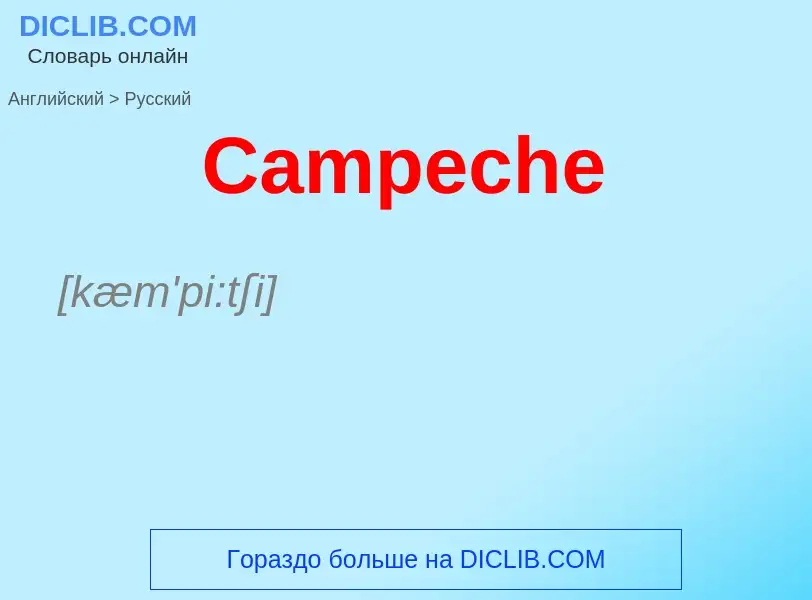Tradução e análise de palavras por inteligência artificial ChatGPT
Nesta página você pode obter uma análise detalhada de uma palavra ou frase, produzida usando a melhor tecnologia de inteligência artificial até o momento:
- como a palavra é usada
- frequência de uso
- é usado com mais frequência na fala oral ou escrita
- opções de tradução de palavras
- exemplos de uso (várias frases com tradução)
- etimologia
Campeche - tradução para russo
[kæm'pi:tʃi]
['lɔgwud]
общая лексика
кампешевое дерево (Haematoxylon campechianum)
кампеш
кампешевый
кампешный
существительное
общая лексика
древесина кампешевого дерева
ботаника
кампешевое дерево (Haematoxulon campechianum)
кампешевое дерево
[kæm'pi:tʃiwud]
общая лексика
кампешевое дерево (Haematoxylon campechianum)
древесина кампешевого дерева
Wikipédia
Campeche (Spanish pronunciation: [kamˈpetʃe] (listen); Yucatec Maya: Kaampech [ˈkàːmpetʃ]), officially the Free and Sovereign State of Campeche (Spanish: Estado Libre y Soberano de Campeche), is one of the 31 states which make up the 32 Federal Entities of Mexico. Located in southeast Mexico, it is bordered by the states of Tabasco to the southwest, Yucatán to the northeast, Quintana Roo to the east, and by the Petén department of Guatemala to the south. It has a coastline to the west with the Gulf of Mexico. The state capital, also called Campeche, was declared a World Heritage Site in 1997. The formation of the state began with the city, which was founded in 1540 as the Spanish began the conquest of the Yucatán Peninsula. The city was a rich and important port during the colonial period, but it declined after Mexico's independence. Campeche was part of the province of Yucatán but split off in the mid-19th century, mostly due to political friction with the city of Mérida. Much of the state's recent economic revival is due to the discovery of petroleum offshore in the 1970s, which has made the coastal cities of Campeche and Ciudad del Carmen important economic centers. The state has important Mayan and colonial sites; however, these are not as well-known or visited as others in the Yucatán.
The state's executive power rests in the governor of Campeche and the legislative power rests in the Congress of Campeche which is a unicameral legislature composed of 35 deputies.

![Maya pyramids]] at [[Calakmul]] Maya pyramids]] at [[Calakmul]]](https://commons.wikimedia.org/wiki/Special:FilePath/Calakmul2.jpg?width=200)
![Periférico]] Pablo García y Montilla, which traverses the limits of Campeche City Periférico]] Pablo García y Montilla, which traverses the limits of Campeche City](https://commons.wikimedia.org/wiki/Special:FilePath/Entrega de la ampliación y modernización del Periférico Pablo García y Montilla. (21612616943).jpg?width=200)

![Maya]] family in Campeche Maya]] family in Campeche](https://commons.wikimedia.org/wiki/Special:FilePath/Mayan Family at Roadside - Campeche - Mexico.jpg?width=200)
![Mennonite]] family in Campeche Mennonite]] family in Campeche](https://commons.wikimedia.org/wiki/Special:FilePath/Mennonite Family - Campeche - Mexico - 01.jpg?width=200)
![Main plaza and [[Campeche Cathedral]] Main plaza and [[Campeche Cathedral]]](https://commons.wikimedia.org/wiki/Special:FilePath/Parquecentral.jpg?width=200)

![histologic staining]] histologic staining]]](https://commons.wikimedia.org/wiki/Special:FilePath/Haematoxylum campechianum wood chips.jpg?width=200)


